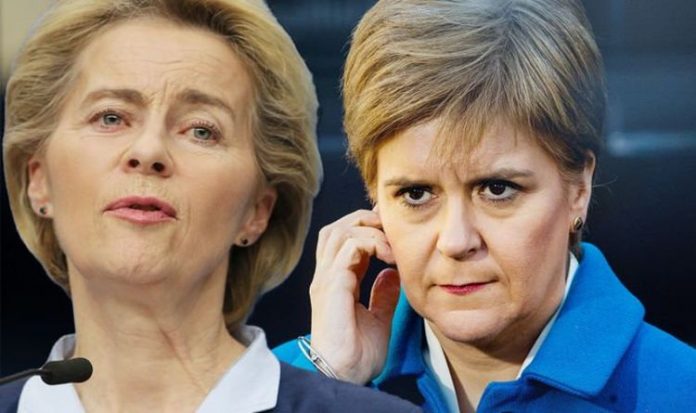Britain left the bloc on January 31, but not everyone in the UK has given up on EU membership. Despite Prime Minister Boris Johnson repeatedly rejecting her independence calls, Scottish First Minister Nicola Sturgeon is still determined to hold a second referendum in 2021. The SNP leader believes Scots are being “dragged” out of the bloc against their will.
However, while Brexit might have made the case for Scottish independence stronger, it has also made it practically more difficult.
An independent Scotland would now border a non-EU country, likely requiring infrastructure and border checks between regions whose communities are deeply intertwined – similar to the problem of the Irish border that severely complicated Brexit talks.
Scotland could also be rejected by Brussels due to its current deficit of seven percent of GDP, unless it adopted a strict austerity programme from the EU as well as potentially adopting the euro.
Moreover, new members can only be allowed into the bloc through a unanimous vote from existing member states – and Holyrood would undoubtedly ruffle feathers if it were to join.
Ms Sturgeon might now have a powerful bargaining chip to negotiate her country’s entry into the European club, though.
Britain’s fishing waters are available to other EU states under mutual access arrangements with set quotas.
However, if Britain leaves without a deal at the end of December, the country will no longer be bound by the EU’s Common Fisheries Policy.
This means that EU fishing vessels will not automatically be allowed into British fishing waters.
Because trade talks between the EU and Britain have now reached their final stage with no breakthrough, this has become a possible outcome.
If no deal happens and Scotland leaves the UK, Ms Sturgeon could offer the EU access to its waters in exchange for membership.
The idea was flouted ahead of the 2014 Scottish independence referendum, when former First Minister Alex Salmond claimed that 12 European nations would have been barred from Scottish and Norwegian waters if an independent Scotland was refused EU membership.
JUST IN: Farage cited Norwegian model as ‘attractive option for Britain’
In a keynote speech to the College of Europe in Brussels, the former SNP leader said Scotland had much to offer the EU and called for a “practical, common-sense” approach to ensuring it inherited membership after leaving the UK.
But in a passage that alarmed the fishing industry, Mr Salmond warned that the alternative would have been “the fishing fleets of 12 countries being denied any access to Scottish waters and, as a consequence, their access to Norwegian waters, which is also dependent on Scottish access”.
David Mundell, the former Scotland Office Minister, said Mr Salmond had made a significant legal and diplomatic error by threatening to block access to Norwegian waters, though.
He claimed an independent Scotland would be legally obliged to allow safe passage to foreign ships with Norwegian fishing rights.
He said: “It has been a telling day for the First Minister’s judgement.
DON’T MISS:
France called on ‘lying’ UK politicians to drop Brexit [REVEALED]
Michael Gove dropped bid for instant return of fisheries control [INSIGHT]
UK firms could be forced to pay up to £1.6bn if EU blocks deal [ANALYSIS]
“In the morning we read about his admiration for Vladimir Putin and by afternoon he was threatening EU members with fishing ground blockades – the very members he would need to unanimously accept a new Scottish state.
“It has not been a masterclass when it comes to his diplomacy skills.
“The truth is, only a very small proportion of other member states’ catches are taken from Scottish waters, and in any accession negotiations other member states would be more likely to press for improved access to Scottish fishing grounds in the North Sea than to make concessions for Scotland.”
Bertie Armstrong, chief executive of the Scottish Fishermen’s Federation, said he wanted to write to the First Minister asking him to explain what he meant.
Mr Armstrong said: “We need to ask the Scottish Government for clarification of exactly what he means.
“Is this a threat to the rest of Europe or is fishing being placed on the table as a bargaining counter?”







